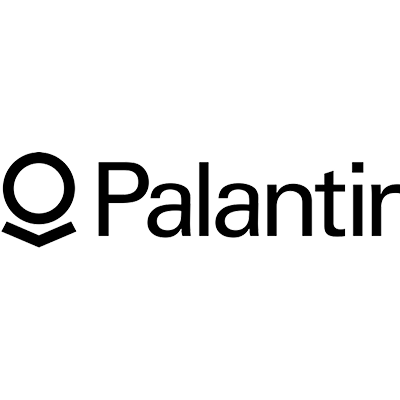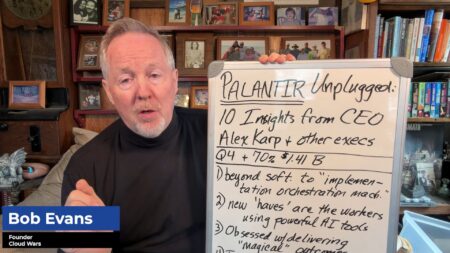
The only match for Palantir’s extraordinary Q3 financial results — overall revenue up 63% to $1.18 billion, turbocharged by a 121% spike in US Commercial growth to $397 million — was the devastatingly candid commentary on the state of the enterprise-software industry from CEO Alexander Karp.
(Palantir joined the Cloud Wars Top 10 about a month ago — to better understand this highly distinctive and explosively growing AI powerhouse, check out my interview with architect Chad Wahlquist here.)
It’s not uncommon for the CEOs of fast-growing but relatively small software companies to dish out a slew of glib soundbites in the hope of getting mentioned with the major players. But in almost half a century of analyzing the tech industry, I have never seen — never — a hypergrowth software company burst onto the scene the way Palantir has with its three powerful components:
- Remarkable financial results: Soaring growth accompanied by enormous profitability (I’ll share key details in a moment);
- Unique and fortified positioning: While Palantir defies traditional tech-industry categories and definitions, perhaps the best way to understand the value it imparts to customers is this Q3 earnings-call comment from CRO Ryan Taylor: Palantir “is the only AI platform that has an actual plan for compounding your enterprise’s AI leverage, not just the model maker’s leverage over you. Sharing this leverage with our customers is our highest priority.”
- A CEO who sees the world not as it is but as it is becoming (stick with this excerpt — it’s well worth it): “Empowering the tenets of being free and having the ability to do creative things in the battlefield context, and then taking enterprises instead of selling them commodity parasitic software with a massive sales force, with kind of lumbering jargon-bearing leaders offering you steaks and dinners and other things we shall not mention in order that you turn the high-value revenue of your enterprise over to them in return for these accolades. We created direct alignment with our customers. And what does that mean? It means when our customers have a unique and tribal way of doing something, whether it’s underwriting or fighting, or making workers even more valuable, we put in FDEs, we orchestrate an ontology, we take the tribal understanding of their business, the specific nature of their business, that makes them particular and valuable and lethal, and we empower that. And how do we participate in that? Unlike seemingly in the most obvious way, we are downstream from the value creation.”
If those excerpts — including the otherworldly financial results — make your head spin a bit, fear not: you’ve got lots of company. Because Palantir is not simply an apps company, or a workflow company, or a data company, or an analytics company, or an integration company, or a data company, or an AI company.

AI Agent & Copilot Summit is an AI-first event to define opportunities, impact, and outcomes with Microsoft Copilot and agents. Building on its 2025 success, the 2026 event takes place March 17-19 in San Diego. Get more details.
Instead, it’s all of those things — but all of those things delivered in whatever combination and/or permutation is most suitable for one particular customer at one particular time for one particular need.
And for a growing number of customers, that approach is being not just welcomed but devoured —let me share a few Q3 highlights and then I’ll expand on that “devoured” point.
- revenue up 63% to $1.18 billion;
- closed $2.8 billion of TCV (total contract value) in the quarter;
- U.S. commercial is now the fastest-growing piece of the Palantir rocketship with Q3 revenue up 121% (not a typo) to $397 million, with $1.3 billion in new deals closed in the quarter;
- closed 204 deals of $1 million or more, including 91 of $5 million or more and 53 of $10 million or more; and
- boosted Q4 guidance to $1.33 billion on projected growth of 61%.
Why ‘Devoured’?
In CEO Karp’s Q3 letter to shareholders, he offers this optimistic view of American businesses and their leaders and of Palantir’s unique willingness and ability to engage with them intimately as the AI Revolution unfolds. As you read this, ask yourself: am I hearing this type of message from other major tech-company CEOs?
“For all of its idiosyncrasies and complexity, American corporate culture remains one of the most adaptive on the planet. Our partners [customers] in the United States — the earliest and most voracious adopters of the novel language models that are presently reordering human life and of the Ontology that allows them to effectively operate — understand how significantly the terrain beneath us all has shifted. And they are racing to experiment and evolve, setting aside preconceived notions of what ought to work for what actually does. It is a ruthless pragmatism, and one that is yielding extraordinary results … In the end, the route for us to something universal — a generalizable artificial intelligence platform — was made possible by an obsessive focus on the specific: the particularized and quite idiosyncratic challenges and technical problems of our disparate set of customers.”
During the Q3 earnings call earlier this week, Karp passionately expanded on that point in a way that I believe is extremely helpful for business leaders looking to understand who Palantir is, what it does, and how/why its business model is different — and perhaps more ideally suited to today’s times.
“The way we work puts us up — forces us to go up the chain of complexity. Every day. So we’re taking on the most painful, most integral, most valuable parts of the stack in every enterprise. And it’s precisely because that’s the way we actually lever our ability to deploy and orchestrate FDE [forward-deployed engineers]. That’s the way we make our products stronger. And quite frankly, that’s the way we produce these numbers because the closer you are to the front line of the very complex problem that a black box was not meant to solve, cannot solve, and at this point, everyone knows was a joke to believe it could solve. And by the way, it’s the safest position for us because this company, we will always believe that we are outsiders. We need to be in the place where the most valuable problem is being solved because that’s the way we end staying, solving the problem tomorrow, and the way we get paid.”
Final Thought
Palantir brings to the Cloud Wars Top 10 and to the global business community a fresh look at how AI in particular and enterprise software in general should be viewed as drivers of success and innovation. I love the stunning growth the company’s generating because that means more competitive pressure for every Cloud Wars Top 10 company — and their ecosystems — to dedicate themselves more intensely to delivering outstanding business outcomes for customers.
And I love Alexander Karp’s willingness to speak bluntly about why, in a world where everything is changing, the approaches of the past are doomed to fail.
Ask Cloud Wars AI Agent about this analysis










